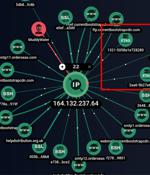Security News

The Iranian threat actor known as MuddyWater is continuing its time-tested tradition of relying on legitimate remote administration tools to commandeer targeted systems. While the nation-state group has previously employed ScreenConnect, RemoteUtilities, and Syncro, a new analysis from Group-IB has revealed the adversary's use of the SimpleHelp remote support software in June 2022.

Back in 2022, about a code execution hole in the widely-used JavaScript sandbox system vm2. Your web browser is a good example of a sandbox, which is how it keeps control over JavaScript programs that it downloads and runs from remote websites.

The maintainers of the vm2 JavaScript sandbox module have shipped a patch to address a critical flaw that could be abused to break out of security boundaries and execute arbitrary shellcode. The flaw, which affects all versions, including and prior to 3.9.14, was reported by researchers from South Korea-based KAIST WSP Lab on April 6, 2023, prompting vm2 to release a fix with version 3.9.15 on Friday.

Several vulnerabilities in Samsung's Exynos chipsets may allow attackers to remotely compromise specific Samsung Galaxy, Vivo and Google Pixel mobile phones with no user interaction."With limited additional research and development, we believe that skilled attackers would be able to quickly create an operational exploit to compromise affected devices silently and remotely," Google Project Zero researchers have noted.

A Croatian national has been arrested for allegedly operating NetWire, a Remote Access Trojan marketed on cybercrime forums since 2012 as a stealthy way to spy on infected systems and siphon passwords.The arrest coincided with a seizure of the NetWire sales website by the U.S. Federal Bureau of Investigation.

Security vulnerabilities in remote desktop programs such as Sunlogin and AweSun are being exploited by threat actors to deploy the PlugX malware. AhnLab Security Emergency Response Center, in a new analysis, said it marks the continued abuse of the flaws to deliver a variety of payloads on compromised systems.

Fortinet has released fixes to address 15 security flaws, including one critical vulnerability impacting FortiOS and FortiProxy that could enable a threat actor to take control of affected systems. "A buffer underwrite vulnerability in FortiOS and FortiProxy administrative interface may allow a remote unauthenticated attacker to execute arbitrary code on the device and/or perform a DoS on the GUI, via specifically crafted requests," Fortinet said in an advisory.

TechRepublic Premium Risk management policy SUMMARY Risk management involves the practice of addressing and handling threats to the organization in the form of cybersecurity attacks and compromised or lost data. The process of establishing appropriate risk management guidelines is critical to ensure company operations and reputation do not suffer adverse impacts.

An older version of Shein's Android application suffered from a bug that periodically captured and transmitted clipboard contents to a remote server. The Microsoft 365 Defender Research Team said it discovered the problem in version 7.9.2 of the app that was released on December 16, 2021.

According to the Quocirca Print Security Landscape 2022 report, printer security is still some way down the worry list of most IT decision makers behind hybrid application platforms, email, public networks, and traditional endpoints. "Printer security is about understanding the threats to the network traffic, to the device itself and to the documents it prints. Every security feature you'll find in secure printers will address one of these categories of risk," he adds before going on to list a range of printer security issues.